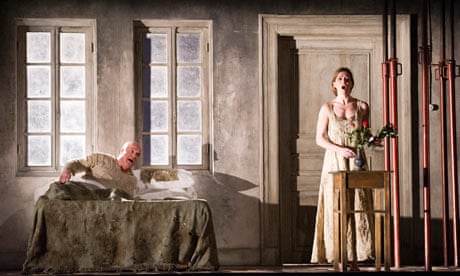It's not often that you feel you were present at a truly significant artistic event – one that people will talk about for years to come, one that throws down a gauntlet to other artists, one that raises the bar. Especially in new opera, where the artform can feel like it's moving at best crabwise: new main-stage operas are rare beasts, often accompanied by hugely overheated expectation (concomitant with the vast resources frequently expended on bringing them to fruition) all too often followed by a sting of disappointment relating to one or more of its elements: a mismatch between libretto and music, for example; a dramaturgical swallow-hole that nobody properly spotted; really good composers tripping up theatrically. And it's not surprising: opera has as many potential pratfalls as it has elements. There's so much that can go wrong when a composer enters the theatre and works not just with notes but with words, singers, a mise-en-scène, a narrative.
On Friday night at the Royal Opera House, nothing went wrong. In fact, the evening was a triumph. Written on Skin, George Benjamin and Martin Crimp's first full-length opera, received its UK premiere and was rapturously received, after an already triumphant debut at the Aix-en-Provence festival last year.
What especially struck me about Benjamin's work was the deep level of the composer's collaboration with the writer of his text, playwright Crimp. So often this is the first problem in opera: two minds not quite coming together (I'd even include Thomas Adès's The Tempest in this category, even though I think it's a wonderful opera; and it was certainly true for me of David Sawer's collaboration with Armando Iannucci for Skin Deep).
Written on Skin, though, was an example of quite the reverse: it was as if Benjamin had been somehow "unlocked" by working with Crimp. Benjamin's music is always exquisite, and occasionally a little well-behaved. His score for Written on Skin is indeed exquisite, but it's also red in tooth and claw – big, beautiful, passionate, sexy music that made you care about the characters despite the fact that they were locked into so many framing devices and distancing techniques (go and see the opera or look out for its broadcast on BBC4, date to be confirmed, to see what I mean). The third element was Katie Mitchell's production. She is another regular collaborator of Crimp's: there was a feeling here of three artistic intelligences working harmoniously together (and that is before you even get on to the beautiful performances from Christopher Purves et al).
Friday night felt like an event: the theatre was full, and the tickets, priced from £3-£65, are selling fast (but the good news is that there are still some left, so go if you can). In fact, it's not too fanciful to say that the auguries for new opera in this country are very good indeed. The revival of Harrison Birtwistle's The Minotaur recently sold out at the Royal Opera – proof that there is real appetite for bold, new and supposedly "difficult" new work on the lyric stage. Opening on 12 April at English National Opera is Sunken Garden, a new work by the splendid Dutch composer Michel van der Aa and novelist David Mitchell. I'm especially looking forward to Richard Ayres' new Peter Pan for Welsh National Opera, with a text by poet Lavinia Greenlaw; and the first staged productions of Gerald Barry's wondrous The Importance of Being Earnest, this autumn. Further ahead, there's the second large-scale opera by Thomas Adès, his reworking of Luis Buñuel's The Exterminating Angel, which will arrive on the Royal Opera's stage in 2017. New opera in Britain seems to me to be in an exuberant, exciting place, with an audience willing and able to take it on. News of its demise has been greatly overstated.




Comments (…)
Sign in or create your Guardian account to join the discussion